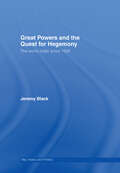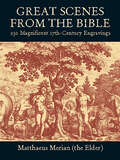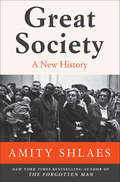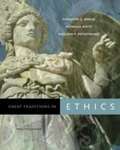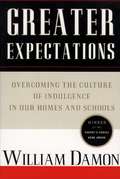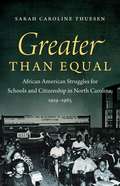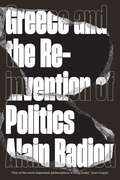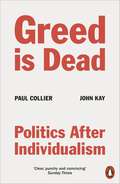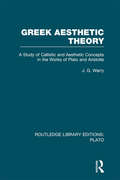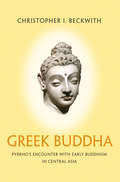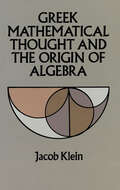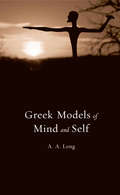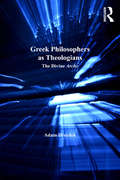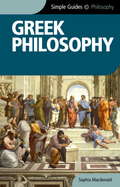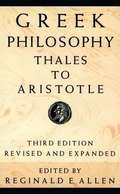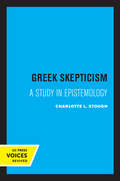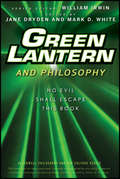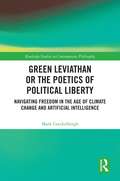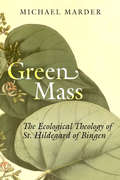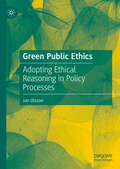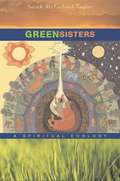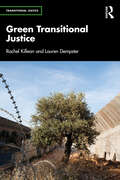- Table View
- List View
Great Powers and the Quest for Hegemony: The World Order since 1500 (War, History And Politics Ser.)
by Jeremy BlackThis timely book provides a general overview of Great Power politics and world order from 1500 to the present. Jeremy Black provides several historical case-studies, each of which throws light on both the power in question and the international system of the period, and how it had developed from the preceding period. The point of departure for this
Great Scenes from the Bible: 230 Magnificent 17th-Century Engravings (Dover Pictorial Archive)
by Matthaeus MerianRemarkably detailed illustrations depict Adam and Eve Driven Out of the Garden of Eden, The Flood, David Slaying Goliath, Christ in the Manger, The Raising of Lazarus, The Crucifixion, and many other scenes. A wonderful pictorial dimension to age-old stories. All 230 plates from the classic 1625 edition.
Great Society: A New History
by Amity ShlaesThe New York Times bestselling author of The Forgotten Man and Coolidge offers a stunning revision of our last great period of idealism, the 1960s, with burning relevance for our contemporary challenges."Great Society is accurate history that reads like a novel, covering the high hopes and catastrophic missteps of our well-meaning leaders." —Alan GreenspanToday, a battle rages in our country. Many Americans are attracted to socialism and economic redistribution while opponents of those ideas argue for purer capitalism. In the 1960s, Americans sought the same goals many seek now: an end to poverty, higher standards of living for the middle class, a better environment and more access to health care and education. Then, too, we debated socialism and capitalism, public sector reform versus private sector advancement. Time and again, whether under John F. Kennedy, Lyndon Johnson, or Richard Nixon, the country chose the public sector. Yet the targets of our idealism proved elusive. What’s more, Johnson’s and Nixon’s programs shackled millions of families in permanent government dependence. Ironically, Shlaes argues, the costs of entitlement commitments made a half century ago preclude the very reforms that Americans will need in coming decades.In Great Society, Shlaes offers a powerful companion to her legendary history of the 1930s, The Forgotten Man, and shows that in fact there was scant difference between two presidents we consider opposites: Johnson and Nixon. Just as technocratic military planning by “the Best and the Brightest” made failure in Vietnam inevitable, so planning by a team of the domestic best and brightest guaranteed fiasco at home. At once history and biography, Great Society sketches moving portraits of the characters in this transformative period, from U.S. Presidents to the visionary UAW leader Walter Reuther, the founders of Intel, and Federal Reserve chairmen William McChesney Martin and Arthur Burns. Great Society casts new light on other figures too, from Ronald Reagan, then governor of California, to the socialist Michael Harrington and the protest movement leader Tom Hayden. Drawing on her classic economic expertise and deep historical knowledge, Shlaes upends the traditional narrative of the era, providing a damning indictment of the consequences of thoughtless idealism with striking relevance for today. Great Society captures a dramatic contest with lessons both dark and bright for our own time.
Great Traditions in Ethics (12th edition)
by Sheldon P. Peterfreund Nicholas P. White Theodore DeniseThis anthology contains readings in Western ethical theory by 27 philosophers from Plato to Bernard Williams. The late Denise (Syracuse U.) et al. begin with a section on classic ethical traditions and topics such as knowledge, virtue, and morality, and conclude with modern continuations and critiques of ideas such as social justice and religion. The introductions to philosophers have been revised, and the appendix on applied ethics (using the preceding readings) has been expanded. There is no index. Annotation ©2007 Book News, Inc., Portland, OR (booknews.com)
Greater Expectations: Nuturing Children's Natural Moral Growth
by William DamonGreater Expectations is the book that exposed the low standards that children are confronted with in our homes, our schools, and throughout our culture. It exploded many of the misconceptions about children and how to raise them, including the cult of self-esteem, "child-centered" learning, and other overly indulgent practices that have been watering down the education and guidance that we are providing our young people. It disclosed how the self-centered ethic is damaging our youth. Greater Expectations started America talking about these issues and about how young people need to be provided with challenges and a sense of purpose if we want them to survive and thrive in life.Provocative and challenging, Greater Expectations was a wake-up call, a must-read for anyone concerned about the growing youth crisis in America and what we can do about it.
Greater than Equal
by Sarah Caroline ThuesenDuring the half century preceding widespread school integration, black North Carolinians engaged in a dramatic struggle for equal educational opportunity as segregated schooling flourished. Drawing on archival records and oral histories, Sarah Thuesen gives voice to students, parents, teachers, school officials, and civic leaders to reconstruct this high-stakes drama. She explores how African Americans pressed for equality in curricula, higher education, teacher salaries, and school facilities; how white officials co-opted equalization as a means of forestalling integration; and, finally, how black activism for equality evolved into a fight for something "greater than equal--integrated schools that served as models of civic inclusion. These battles persisted into the Brown era, mobilized black communities, narrowed material disparities, fostered black school pride, and profoundly shaped the eventual movement for desegregation. Thuesen emphasizes that the remarkable achievements of this activism should not obscure the inherent limitations of a fight for equality in a segregated society. In fact, these unresolved struggles are emblematic of fault lines that developed across the South, and serve as an urgent reminder of the inextricable connections between educational equality, racial diversity, and the achievement of first-class citizenship.
Greece and the Reinvention of Politics: On Greece
by Alain BadiouOne of the world’s leading radical philosophers analyses the failure of the Syriza experience in GreeceIn a series of seven trenchant interventions Alain Badiou analyses the decisive developments in Greece since 2011. Badiou considers this Mediterranean country “a sort of open-air political lesson”, with much to tell us about the wider situation. Greece is exemplary of “our fundamental contradictions in Europe, which are also ultimately the fundamental contradictions of the world such as it is—the world served up to the authoritarian anarchy of capitalism.”Notwithstanding the Greeks’ heartening opposition to the financial markets’ hegemony, Badiou considers it also important to address the reasons why this opposition failed. “Movementist” politics may arouse widespread sympathy, but for the French philosopher they have “absolutely no effect other than to temporarily trap the movement in the negative weakness of its affects.”Badiou argues that a consequential opposition inspired by the emancipatory politics of the past—or by what he calls “the communist hypothesis”—should set its compass by the “orienting maxims” proposed in this book, defining a direction for political action.
Greed Is Dead: Politics After Individualism
by Paul Collier John KayTwo of the UK's leading economists call for an end to extreme individualism as the engine of prosperity 'provocative but thought-provoking and nuanced' TelegraphThroughout history, successful societies have created institutions which channel both competition and co-operation to achieve complex goals of general benefit. These institutions make the difference between societies that thrive and those paralyzed by discord, the difference between prosperous and poor economies. Such societies are pluralist but their pluralism is disciplined.Successful societies are also rare and fragile. We could not have built modernity without the exceptional competitive and co-operative instincts of humans, but in recent decades the balance between these instincts has become dangerously skewed: mutuality has been undermined by an extreme individualism which has weakened co-operation and polarized our politics.Collier and Kay show how a reaffirmation of the values of mutuality could refresh and restore politics, business and the environments in which people live. Politics could reverse the moves to extremism and tribalism; businesses could replace the greed that has degraded corporate culture; the communities and decaying places that are home to many could overcome despondency and again be prosperous and purposeful. As the world emerges from an unprecedented crisis we have the chance to examine society afresh and build a politics beyond individualism.
Greek Aesthetic Theory (Routledge Library Editions: Plato)
by J G WarryThis book provides a clear and informed account of aesthetic and callistic concepts as they occur in the works of Plato and Aristotle. The author illustrates their ideas on art and beauty by close reference to their texts and finds a profound similarity which unites them, revealing many of their differences to be complementary aspects of an essentially similar viewpoint. He also shows how Greek notions of art and beauty are not merely primitive steps in the advance to modern ideas but have a direct relevance to modern critical controversies.
Greek Buddha
by Christopher I. BeckwithPyrrho of Elis accompanied Alexander the Great to Central Asia and India during the Graeco-Macedonian invasion and conquest of the Persian Empire in 334-324 BC, and while there met with teachers of Early Buddhism. Greek Buddha shows how Buddhism shaped the philosophy of Pyrrho, the famous founder of Pyrrhonian scepticism in ancient Greece. Identifying Pyrrho's basic teachings with those of Early Buddhism, Christopher I. Beckwith traces the origins of a major tradition in Greek philosophy to Gandhāra, a country in Central Asia and northwestern India.Using a range of primary sources, he systematically looks at the teachings and practices of Pyrrho and of Early Buddhism, including those preserved in testimonies by and about Pyrrho, in the report on Indian philosophy two decades later by the Seleucid ambassador Megasthenes, in the first-person edicts by the Indian king Devānāṃpriya Priyadarśi referring to a popular variety of the Dharma in the early third century BC, and in Taoist echoes of Gautama's Dharma in Warring States China. Beckwith demonstrates how the teachings of Pyrrho agree closely with those of the Buddha śākyamuni, "the Scythian Sage." In the process, he identifies eight distinct attested philosophical schools in ancient northwestern India and Central Asia, including Early Zoroastrianism, Early Brahmanism, and several forms of Early Buddhism. Beckwith then shows the influence that Pyrrho's brand of scepticism had on the evolution of Western thought, first in Antiquity, and later, during the Enlightenment, on the great philosopher and self-proclaimed Pyrrhonian, David Hume.Greek Buddha demonstrates that through Pyrrho, Early Buddhist thought had a significant impact on Western philosophy.
Greek Mathematical Thought and the Origin of Algebra
by Jacob KleinImportant study focuses on the revival and assimilation of ancient Greek mathematics in the 13th-16th centuries, via Arabic science, and the 16th-century development of symbolic algebra. This brought about the crucial change in the concept of number that made possible modern science -- in which the symbolic "form" of a mathematical statement is completely inseparable from its "content" of physical meaning. Includes a translation of Vieta's Introduction to the Analytical Art. 1968 edition. Bibliography.
Greek Models of Mind and Self
by A. A. LongAn authoritative treatment of Greek modes of self-understanding, Greek Models of Mind and Self demonstrates how ancient thinkers grappled with what is closest to us and yet still most mysterious―our own essence as singular human selves―and how the study of Greek thought can enlarge and enrich our experience.
Greek Models of Mind and Self
by Anthony A. LongThis lively book offers a wide-ranging study of Greek notions of mind and human selfhood from Homer through Plotinus. A. A. Long anchors his discussion in questions of recurrent and universal interest. What happens to us when we die? How is the mind or soul related to the body? Are we responsible for our own happiness? Can we achieve autonomy? Long asks when and how these questions emerged in ancient Greece, and shows that Greek thinkers’ modeling of the mind gave us metaphors that we still live by, such as the rule of reason or enslavement to passion. He also interrogates the less familiar Greek notion of the intellect’s divinity, and asks what that might mean for us.<P><P> Because Plato’s dialogues articulate these themes more sharply and influentially than works by any other Greek thinker, Plato receives the most sustained treatment in this account. But at the same time, Long asks whether Plato’s explanation of the mind and human behavior is more convincing for modern readers than that contained in the older Homeric poems. Turning to later ancient philosophy, especially Stoicism, Long concludes with an exploration of Epictetus’s injunction to live life by making correct use of one’s mental impressions.<P> An authoritative treatment of Greek modes of self-understanding, Greek Models of Mind and Self demonstrates how ancient thinkers grappled with what is closest to us and yet still most mysterious―our own essence as singular human selves―and how the study of Greek thought can enlarge and enrich our experience.
Greek Philosophers as Theologians: The Divine Arche
by Adam DrozdekConcepts of God presented by Greek philosophers were significantly different from the image of the divine of popular religion and indicate a fairly sophisticated theological reflection from the very inception of Greek philosophy. This book presents a comprehensive history of theological thought of Greek philosophers from the Presocratics to the early Hellenistic period. Concentrating on views concerning the attributes of God and their impact on eschatological and ethical thought, Drozdek explains that theology was of paramount importance for all Greek philosophers even in the absence of purely theological or religious language.
Greek Philosophy - Simple Guides
by Sophia MacdonaldTHIS BOOK WILL HELP YOU* to appreciate the revolution in thinking brought about by the Ancient Greek philosophers, who sought to make sense of the world through analysis, reasoning and argument* to recognize the key ideas of the most significant philosophers and their contribution to Western thought* to learn about the philosophers' lives, and their impact on society* to appreciate the value of questioning received wisdom and submitting it to rigorous analysisTo live in the modern world is to owe a debt of gratitude to the Ancient Greeks. Ancient Greece was one of the wellsprings of European civilization, and the Greeks were both the pioneers of rigorous analytical thought and the creators of prose and poetry that speak to us over the centuries.Materialism and idealism form the two major strands of Greek philosophy: thinking about the universe, nature and matter; and thinking about humanity, politics, justice, good and evil, and our relationship with the divine. The Greeks were the first to distinguish between myth and philosophy, and to develop a scientific method of enquiry. In ancient Greece 'natural philosophers' studied mathematics, physics, logic, cosmology, medicine, Politics, ethics and aesthetics. Democracy, atoms, copycat killings -- the Greeks had opinions on these and many more, and their conclusions have often proved prescient. Cynicism and Stoicism are Greek philosophical schools whose names have passed into common parlance.This lucid introduction to Greek philosophy links important ideas to key personalities and places. It shows the development and movement of people and ideas around the Mediterranean world, from the time of the earliest pre Socratic philosophers, through Pythagoras, Heraclitus, and the Sophists to Socrates, Plato, Aristotle, the Cynics and the Stoics. Written in a clear and engaging style, it is a fascinating account of the major source of Western culture and today's knowledge-based society.ACCESS THE WORLD'S PHILOSOPHIESSimple Guides: Philosophy is a series of concise introductions to the major philosophies of the world. Written by experts in the field, these accessible guides offer a fascinating account of the rich variety of arguments ideas and systems of thought articulated by different cultures in the attempt to explore and define the nature of reality, and the meaning, purpose and proper conduct of life.The Simple Guides will appeal to analytical thinkers and spiritual seekers alike. Taken together, they provide a basic introduction to the evolution of human thought, and a point of reference for further exploration and discovery. By offering essential insights into the world views of different societies, they also enable travellers to behave in a way that fosters mutual respect and understanding.
Greek Philosophy: Thales to Aristotle (Third Edition)
by Reginald E. AllenEvery history of philosophy begins with Thales, and records with proper solemnity his opinion that the source of all things is water. And every beginning student is shocked. Not until he reaches Plato and Aristotle does he find himself in a world recognizably his own, a world whose science, law, and logic are of a type his own experience has made familiar. The pronouncements of philosophers are usually answers to questions, whether or not the questions are explicitly put. If Thales claimed that the source of all things is water, his question must presumably have been, What is the source of all things?
Greek Popular Morality in the Time of Plato and Aristotle
by K. J. DoverA book useful in understanding events of the time, such as the death of Socrates.
Greek Skepticism: A Study in Epistemology
by Charlotte L. StoughThis title is part of UC Press's Voices Revived program, which commemorates University of California Press’s mission to seek out and cultivate the brightest minds and give them voice, reach, and impact. Drawing on a backlist dating to 1893, Voices Revived makes high-quality, peer-reviewed scholarship accessible once again using print-on-demand technology. This title was originally published in 1969.
Greek and Roman Aesthetics
by Oleg V. Bychkov Anne SheppardThis anthology of philosophical texts by Greek and Roman authors brings together works from the late fifth century BC to the sixth century AD that comment on major aesthetic issues such as the perception of beauty and harmony in music and the visual arts, structure and style in literature, and aesthetic judgement. It includes important texts by Plato and Aristotle on the status and the role of the arts in society and in education, and Longinus' reflections on the sublime in literature, in addition to less well-known writings by Philodemus, Cicero, Seneca, Plotinus, Augustine and Proclus. Most of the texts have been newly translated for this volume, and some are available in English for the first time. A detailed introduction traces the development of classical aesthetics from its roots in Platonism and Aristotelianism to its ultimate form in late Antiquity.
Green Lantern and Philosophy: No Evil Shall Escape this Book (The Blackwell Philosophy and Pop Culture Series #21)
by William IrwinThe first look at the philosophy behind the Green Lantern comics—timed for the release of the Green Lantern movie in June 2011 The most recent Green Lantern series—Blackest Night—propelled GL to be the top-selling comic series for more than a year, the latest twist in seven decades of Green Lantern adventures. This book sheds light on the deep philosophical issues that emerge from the Green Lantern Corps's stories and characters, from what Plato's tale of the Ring of Gyges tells us about the Green Lantern ring and the desire for power to whether willpower is the most important strength to who is the greatest Green Lantern of all time. Gives you a new perspective on Green Lantern characters, story lines, and themes Shows what philosophical heavy hitters such as Aristotle, Descartes, and Kant can teach us about members of the Green Lantern Corp and their world Answers your most pressing Green Lantern questions, including: What motivates Hal Jordan to be a Green Lantern? Does the Blackest Night force us to confront old male/female stereotypes? What is the basis for moral judgment in the Green Lantern Corps? Is Hal Jordan a murderer? Whether you're a new fan or an elder from Oa, Green Lantern and Philosophy is a must-have companion.
Green Leviathan or the Poetics of Political Liberty: Navigating Freedom in the Age of Climate Change and Artificial Intelligence (Routledge Studies in Contemporary Philosophy)
by Mark CoeckelberghThis book discusses the problem of freedom and the limits of liberalism considering the challenges of governing climate change and artificial intelligence (AI). It mobilizes resources from political philosophy to make an original argument about the future of technology and the environment. Can artificial intelligence save the planet? And does that mean we will have to give up our political freedom? Stretching the meaning of freedom but steering away from authoritarian options, this book proposes that, next to using other principles such as justice and equality and taking collective action and cooperating at a global level, we adopt a positive and relational conception of freedom that creates better conditions for human and non-human flourishing. In contrast to easy libertarianism and arrogant techno-solutionism, this offers a less symptomatic treatment of the global crises we face and gives technologies such as AI a role in the gathering of a new, more inclusive political collective and the ongoing participative making of new common worlds. Written in a clear and accessible style, Green Leviathan or the Poetics of Political Liberty will appeal to researchers and students working in political philosophy, environmental philosophy, and the philosophy of technology.
Green Mass: The Ecological Theology of St. Hildegard of Bingen
by Michael MarderGreen Mass is a meditation on—and with—twelfth-century Christian mystic and polymath Saint Hildegard of Bingen. Attending to Hildegard's vegetal vision, which greens theological tradition and imbues plant life with spirit, philosopher Michael Marder uncovers a verdant mode of thinking. The book stages a fresh encounter between present-day and premodern concerns, ecology and theology, philosophy and mysticism, the material and the spiritual, in word and sound. Hildegard's lush notion of viriditas, the vegetal power of creation, is emblematic of her deeply entwined understanding of physical reality and spiritual elevation. From blossoming flora to burning desert, Marder plays with the symphonic multiplicity of meanings in her thought, listening to the resonances between the ardency of holy fire and the aridity of a world aflame. Across Hildegard's cosmos, we hear the anarchic proliferation of her ecological theology, in which both God and greening are circular, without beginning or end. Introduced with a foreword by philosopher Marcia Sá Cavalcante Schuback and accompanied by cellist Peter Schuback's musical movements, which echo both Hildegard's own compositions and key themes in each chapter of the book, this multifaceted work creates a resonance chamber, in which to discover the living world anew. The original compositions accompanying each chapter are available free for streaming and for download at www.sup.org/greenmass
Green Public Ethics: Adopting Ethical Reasoning in Policy Processes
by Jan OlssonThis book argues that ethical reasoning should be adopted into policy processes in order to improve environmental regulations. It considers how public administrators and civil servants play key roles in policy making and implementation, and demonstrates how the inclusion of green public ethics at every stage of the policy process could drastically enhance sustainable development initiatives. Filling an important void in the literature on policymaking and environmental ethics, the book draws from empirical case studies to demonstrate how ‘green’ ethical reasoning can be utilised by practitioners and stakeholders in democratic governments. It will appeal to all those interested in public policy, public administration, philosophy and environmental studies.
Green Sisters: A Spiritual Ecology (Institute For Human Sciences Vienna Lecture Ser.)
by Sarah McFarland TaylorA hundred years after William James delivered the celebrated lectures that became The Varieties of Religious Experience, one of the foremost thinkers in the English-speaking world returns to the questions posed in James's masterpiece to clarify the circumstances and conditions of religion in our day. An elegant mix of the philosophy and sociology of religion, Charles Taylor's powerful book maintains a clear perspective on James's work in its historical and cultural contexts, while casting a new and revealing light upon the present. Lucid, readable, and dense with ideas that promise to transform current debates about religion and secularism, Varieties of Religion Today is much more than a revisiting of James's classic. Rather, it places James's analysis of religious experience and the dilemmas of doubt and belief in an unfamiliar but illuminating context, namely the social horizon in which questions of religion come to be presented to individuals in the first place. Taylor begins with questions about the way in which James conceives his subject, and shows how these questions arise out of different ways of understanding religion that confronted one another in James's time and continue to do so today. Evaluating James's treatment of the ethics of belief, he goes on to develop an innovative and provocative reading of the public and cultural conditions in which questions of belief or unbelief are perceived to be individual questions. What emerges is a remarkable and penetrating view of the relation between religion and social order and, ultimately, of what "religion" means.
Green Transitional Justice (Transitional Justice)
by Rachel Killean Lauren DempsterThis book rethinks the boundaries of transitional justice, urging scholars and practitioners to confront the often-overlooked nexus between mass violence and ecological harm.Through an in-depth analysis of the field’s limitations – such as its anthropocentric legalism, neocolonial practices, and alignment with neoliberalism – the book critiques the historical marginalisation of Nature in transitional justice discourse and practice. It argues that ignoring environmental harm not only undermines the possibility of holistic justice but also perpetuates structural violence and inequality. In response, the book sketches a ‘greener’ transitional justice, integrating principles from environmental justice, Indigenous knowledge systems, and ecocentric perspectives. It explores the possibilities of recognising Nature as a victim of mass violence, adapting existing mechanisms to incorporate environmental harm, and fostering transformative approaches premised on the interdependence of human and ecological well-being.This book is written for students, researchers, and practitioners of transitional justice and fields related to conflict transformation, peacebuilding, environmental protection, and development.
